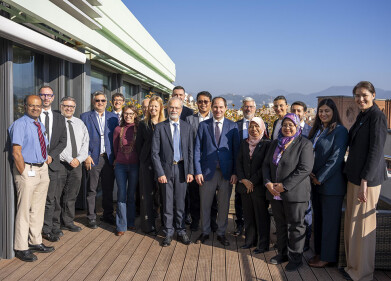Air clean up
How Bad Is UK Shipping for Pollution?
Feb 18 2018
The UK shipping industry could be far worse for the air quality of port and coastal towns than previously imagined, a new study has revealed. Commissioned by the government and undertaken by the National Atmospheric Emissions Inventory (NAEI), the report shows that nitrogen dioxide (NO2) emissions from shipping vessels are four times higher than previously suggested.
With sulphur dioxide (SO2) emissions three times higher than believed as well, it’s suspected that the UK shipping industry is a far more polluting beast than previously thought and a cause for serious concern for residents of port cities and towns such as Grimsby, Liverpool and Southampton, where it could contribute up to 30% of all air pollution.
A major contributing factor
The UK has long suffered from deplorable levels of air quality and the incumbent government in particular has repeatedly come under fire for their inertia on the issue. While Theresa May has insisted her government prioritises improving air quality and reducing transport-related pollution, the vast majority of proposed measures have focused on road pollution – which ignores the serious contribution that shipping makes to our airwaves.
“Cars are not the only sources of emissions in our air. Ships are more fuel efficient than road vehicles, but they use fuels which produce greater levels of emissions than road diesel,” explained Dr Matt Loxham, an air pollution expert at the University of Southampton. “This, in combination with the concentration of vessels in relatively small port areas and shipping lanes, is the reason why there is concern around shipping emissions.”
Indeed, the NAEI report shows that shipping vessels operating in and around the UK use up to 250% more fuel than previously imagined. This, in turn, results in far greater emissions than past studies estimated, with the NAEI predicting that roughly 10% of all nitrogen oxides (NOX) emissions came from the country’s ships. It’s also thought that shipping accounts for approximately double the emissions that the aviation industry does.
Lack of regulation
The elephant in the room is here the glaring absence of regulation when it comes to shipping emissions. While land-based industry was subjected to strict legislation with the introduction of the Industrial Emissions Directive (IED) in January 2013, the shipping sector has enjoyed relative freedom by comparison. Ships generally use heavy fuel oil – the dirtiest and most contaminating fuel available – and their engines are not subjected to the rigorous demands that road vehicles are.
The matter is further complicated by the fact that shipping is not regulated by the government or even by the EU – but instead by the International Maritime Organisation (IMO), a branch of the UN which has been notoriously lax when it comes to implementing environmental safeguards. Of course, the British government are free to introduce their own rules and regulations, but May has previously indicated that she does not wish to hamstring the industry or risk alienating foreign custom.
However, not everyone agrees that this is a valid reason for resisting change. “Even if they want to stand by the argument that they wish to facilitate international shipping and make the UK ports attractive to them, there is no excuse for why they did not implement much lower limits for ships which either only trade within the UK or are providing assistance in ports,” said Professor Mikis Tsimplis from the University of Southampton.
Events
Feb 05 2025 Nantes, France
Feb 16 2025 Kampala, Uganda
Feb 26 2025 Chennai, India
Feb 26 2025 Tulsa, OK, USA
WATERTECH CHINA (GUANGDONG) 2025
Mar 05 2025 Guangdong, China












